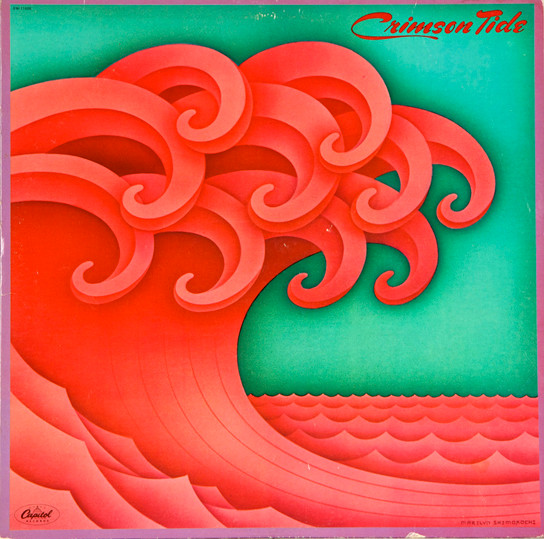Meaning Of Crimson Tide: Unveiling The Symbolism And Significance
Understanding the meaning of crimson tide opens a window into a world of cultural, historical, and literary significance. This phrase, though seemingly simple, carries deep symbolism and is often associated with powerful themes such as struggle, triumph, and resilience. Whether you're a literature enthusiast, a history buff, or simply curious about language, this article will provide an in-depth exploration of what "crimson tide" truly represents.
At its core, the meaning of crimson tide transcends its literal definition. It evokes images of deep red waves, symbolizing passion, intensity, and sometimes even danger. This metaphorical imagery has been used in various contexts, from literature to sports, making it a versatile and intriguing concept to explore.
In this article, we will delve into the origins of the phrase, its cultural significance, and its applications in modern contexts. By the end, you'll have a comprehensive understanding of why crimson tide continues to captivate audiences worldwide.
Read also:Lily Dolores Harris A Comprehensive Biography And Career Overview
Table of Contents
- Origins of Crimson Tide
- Crimson Tide in Literature
- Historical Context of Crimson Tide
- Crimson Tide in Sports
- Symbolism Behind Crimson Tide
- Modern Usage of Crimson Tide
- Crimson Tide: The Film
- Cultural Significance of Crimson Tide
- Global Perspective on Crimson Tide
- Conclusion
Origins of Crimson Tide
The phrase "crimson tide" has its roots in both nature and human imagination. Historically, it refers to the deep red color of the ocean during sunset or sunrise, creating a breathtaking visual spectacle. However, the term gained prominence in the early 20th century when it was adopted by the University of Alabama's football team as their nickname. This association with athletics added a new layer of meaning to the phrase, symbolizing strength, unity, and perseverance.
Etymology of Crimson Tide
Etymologically, "crimson" originates from the Latin word "coccinus," meaning "scarlet." The word "tide," on the other hand, comes from Old English "tīd," referring to the periodic rise and fall of the sea. Together, these words create a powerful metaphor that resonates with both natural and human experiences.
Interestingly, the term "crimson tide" was first popularized in a 1907 football game when a sportswriter described the University of Alabama's team as a "crimson tide" due to their muddy uniforms and relentless performance. This vivid imagery stuck and became synonymous with the team's identity.
Crimson Tide in Literature
In literature, the meaning of crimson tide often reflects themes of passion, conflict, and transformation. Writers use this phrase to evoke strong emotions and create vivid imagery in their works. From poetry to novels, the phrase has been employed to symbolize both beauty and danger, making it a versatile literary device.
Examples in Famous Works
- John Milton's "Paradise Lost" uses the imagery of crimson tide to describe the fall of man and the subsequent struggle for redemption.
- William Faulkner's "The Sound and the Fury" incorporates the phrase to depict the tumultuous emotions of the Compson family.
- Modern poets often use crimson tide to explore themes of love, loss, and resilience, showcasing its timeless appeal.
Historical Context of Crimson Tide
The historical significance of crimson tide extends beyond literature and sports. In ancient cultures, the color red was often associated with life, vitality, and power. This connection is evident in various rituals and ceremonies where red played a central role. Over time, the phrase "crimson tide" came to symbolize moments of great change or upheaval.
Historical Events Linked to Crimson Tide
During the American Civil War, the term was occasionally used to describe the bloodshed and sacrifices made by soldiers. Similarly, in the context of natural disasters, crimson tide was used to describe the devastating impact of floods and tidal waves. These historical references add depth to the phrase's meaning, highlighting its relevance across different eras.
Read also:Exploring Notre Dame Hesburgh Library A Comprehensive Guide
Crimson Tide in Sports
Perhaps the most well-known association of crimson tide is with the University of Alabama's football team, the Alabama Crimson Tide. This nickname has become synonymous with excellence and tradition in college athletics. The team's success on the field has further cemented the phrase's place in popular culture.
Impact on Team Identity
- The Crimson Tide's success has inspired countless fans and athletes, making it one of the most recognizable nicknames in sports.
- The phrase serves as a rallying cry for players and supporters alike, embodying the spirit of competition and teamwork.
- Through its association with the team, crimson tide has become a symbol of perseverance and determination.
Symbolism Behind Crimson Tide
Symbolism plays a crucial role in understanding the meaning of crimson tide. At its heart, the phrase represents the intersection of nature and human experience. The deep red color evokes feelings of passion and intensity, while the tide symbolizes the ebb and flow of life itself.
Key Symbolic Elements
- Crimson: Represents passion, vitality, and sometimes danger.
- Tide: Symbolizes change, movement, and the inevitability of time.
- Combination: Together, they create a powerful metaphor for life's challenges and triumphs.
Modern Usage of Crimson Tide
In contemporary times, the meaning of crimson tide continues to evolve. It is used in various contexts, from marketing campaigns to political speeches, where its evocative power is harnessed to convey strong messages. Additionally, the phrase remains a staple in popular culture, appearing in movies, music, and even video games.
Examples in Popular Culture
- The 1995 film "Crimson Tide" starring Denzel Washington and Gene Hackman brought the phrase into mainstream consciousness, using it as a backdrop for a gripping story of leadership and conflict.
- Modern music artists often incorporate the phrase into their lyrics, using it to explore themes of love and resilience.
- In branding, companies leverage the phrase's emotional resonance to connect with their audience on a deeper level.
Crimson Tide: The Film
Released in 1995, "Crimson Tide" is a critically acclaimed film that explores the psychological and ethical dilemmas faced by military leaders during a time of crisis. Directed by Tony Scott and starring Denzel Washington and Gene Hackman, the movie uses the phrase as a metaphor for the intense pressures and challenges faced by its characters.
Themes Explored in the Film
- Leadership and decision-making under pressure.
- The balance between following orders and exercising moral judgment.
- The human cost of war and the importance of communication.
Cultural Significance of Crimson Tide
Culturally, the meaning of crimson tide resonates across different societies and communities. Its universal appeal lies in its ability to capture the essence of human experiences, from the struggles of everyday life to the triumphs of achievement. Whether in literature, sports, or popular culture, the phrase continues to inspire and captivate audiences worldwide.
Global Reception
Internationally, crimson tide has been embraced as a symbol of resilience and determination. In countries where English is not the primary language, the phrase's imagery and symbolism are often adapted to local contexts, maintaining its relevance and impact.
Global Perspective on Crimson Tide
From a global perspective, the meaning of crimson tide highlights the interconnectedness of human experiences. While its origins may be rooted in specific cultural and historical contexts, its themes of passion, struggle, and triumph transcend geographical boundaries. This universal appeal makes the phrase a powerful tool for communication and expression.
Adaptation in Different Cultures
- In Asian cultures, the phrase is often associated with the changing seasons and the cyclical nature of life.
- In European contexts, crimson tide is linked to historical events and the legacy of past conflicts.
- In African traditions, the phrase is used to symbolize community and collective strength.
Conclusion
In conclusion, the meaning of crimson tide is a rich tapestry of cultural, historical, and literary significance. From its origins in nature and sports to its applications in modern contexts, the phrase continues to inspire and captivate audiences worldwide. By exploring its various dimensions, we gain a deeper understanding of its enduring appeal.
We invite you to share your thoughts and insights in the comments section below. Whether you're a fan of literature, sports, or popular culture, your perspective adds value to the conversation. Additionally, feel free to explore other articles on our site for more in-depth explorations of fascinating topics.
References:
- Milton, John. "Paradise Lost."
- Faulkner, William. "The Sound and the Fury."
- Scott, Tony (Director). "Crimson Tide." Warner Bros., 1995.


